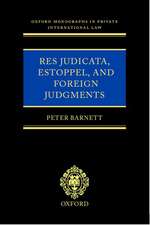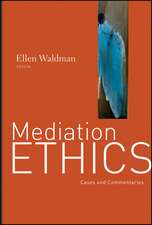The Culture of International Arbitration and The Evolution of Contract Law
Autor Joshua D H Kartonen Limba Engleză Hardback – 7 mar 2013
Preț: 614.74 lei
Preț vechi: 880.78 lei
-30% Nou
Puncte Express: 922
Preț estimativ în valută:
117.63€ • 122.81$ • 97.35£
117.63€ • 122.81$ • 97.35£
Carte tipărită la comandă
Livrare economică 25-31 martie
Preluare comenzi: 021 569.72.76
Specificații
ISBN-13: 9780199658008
ISBN-10: 0199658005
Pagini: 306
Dimensiuni: 163 x 236 x 24 mm
Greutate: 0.62 kg
Editura: Oxford University Press
Colecția OUP Oxford
Locul publicării:Oxford, United Kingdom
ISBN-10: 0199658005
Pagini: 306
Dimensiuni: 163 x 236 x 24 mm
Greutate: 0.62 kg
Editura: Oxford University Press
Colecția OUP Oxford
Locul publicării:Oxford, United Kingdom
Recenzii
The Culture of International Arbitration and the Evolution of Contract Taw is anticipated to become a leading scholarly work for the field of international commercial arbitration because it manages to deconstruct an extremely complex and elusive topic to make it accessible, discernible and highly engaging for both those who are already within the field, and importantly for those presently outside of it.
Professor Joshua Karton has written an invaluable contribution to our understanding of the international arbitration community and the private international contract law which it presides over. I would highly recommend this book for the guidance and insight it offers. It is thorough, coherent, and very difficult to put down. A 'must read' for all who practice or aspire to practice in the realm of international commercial arbitration.
This is a unique book. It delineates and explains in a scholarly and readable way what has developed as the global culture in international commercial arbitration as no one has before. It should be read by and in the library of every arbitrator and arbitration counsel.
This is a stimulating book that breaks new ground in our field.
Professor Joshua Karton has written an invaluable contribution to our understanding of the international arbitration community and the private international contract law which it presides over. I would highly recommend this book for the guidance and insight it offers. It is thorough, coherent, and very difficult to put down. A 'must read' for all who practice or aspire to practice in the realm of international commercial arbitration.
This is a unique book. It delineates and explains in a scholarly and readable way what has developed as the global culture in international commercial arbitration as no one has before. It should be read by and in the library of every arbitrator and arbitration counsel.
This is a stimulating book that breaks new ground in our field.
Notă biografică
Joshua Karton is an Assistant Professor in the Faculty of Law at Queen's University in Kingston, Ontario, Canada, where he has taught since 2009. A graduate of Yale (BA 2001) and Columbia Law School (JD 2005), he is a member of the New York Bar. He practiced as an associate in the litigation/arbitration group at Cleary Gottlieb Steen & Hamilton LLP in New York before pursuing his doctoral studies at Cambridge, from which he graduated in 2011 with a PhD in law. This book is based on his PhD thesis, which was supervised by James Crawford and Louise Merrett. Professor Karton was awarded the International & Comparative Law Quarterly Young Scholar Prize for an article based on an earlier version of Chapter Six of this book.












